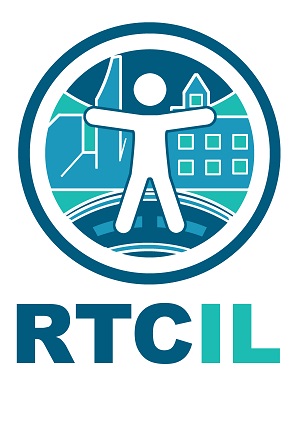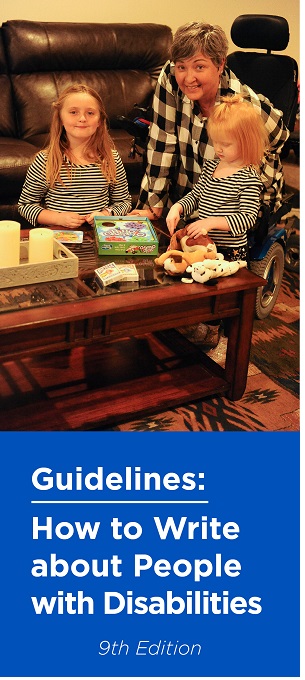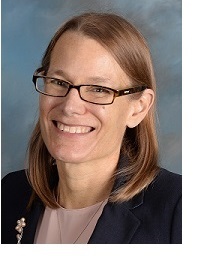RTC/IL News Fall 2020
 For our partners, advisors, and stakeholders
For our partners, advisors, and stakeholders
In This Edition:
- Greetings from the Director
- RTC/IL Celebrates 30th Anniversary of the ADA
- Help America Vote Act Fact Sheet Available
- RTC/IL Compiles COVID-19 Resources
- New RTC/IL Logo
- Koon Supports Aging Study
- Out and About Program Connects Participants to the Community from Home during the Pandemic
- Research and Training Center Explores Coronavirus Impact
- Presentations
- Publications
Greetings from the Director
Greetings from the Research and Training Center on Independent Living!
Events this year have occasioned much reflection on our mission and our principles, as 2020 marks both the 40th Anniversary of the RTC/IL’s existence and the 30th Anniversary of the Americans with Disabilities Act. We celebrate these milestones with a new logo for the center, a new edition of our guide for writing about people with disabilities, and a flurry of online events. We hope that you will join us in welcoming disability rights activist Judy Heumann to KU’s online “campus” in October or register for “Look Back, Look Forward,” our retrospective of the 30-year life of the ADA.
The pandemic and the 2020 tropical storm and fire seasons remind us that people with disabilities are disproportionately affected by public health emergencies and natural disasters. We continue to update our COVID-19 resource page, and we encourage you to explore and share our many emergency preparedness resources. In the meantime, please enjoy this newsletter, where you will find updates on our ongoing and developing projects.
All the best,
Jean P. Hall, Director
Research and Training Center on Independent Living
RTC/IL Celebrates 30th Anniversary of the ADA
 RTC/IL celebrates the 30th Anniversary of the Americans with Disabilities Act (ADA) with a new publication and participation in two online events. July 26 saw the release of the 9th edition of Guidelines: How to Write about People with Disabilities. First published in 1984, the brochure has become a classic on person-first language. Acknowledging that language evolves and that there is much diversity of opinion within the disability community on acceptable terminology, the 9th edition discusses the shift toward identity-first language and offers updated recommendations. The Guidelines are available for download or to view as a webpage. To order print copies, contact sethcoul@ku.edu.
RTC/IL celebrates the 30th Anniversary of the Americans with Disabilities Act (ADA) with a new publication and participation in two online events. July 26 saw the release of the 9th edition of Guidelines: How to Write about People with Disabilities. First published in 1984, the brochure has become a classic on person-first language. Acknowledging that language evolves and that there is much diversity of opinion within the disability community on acceptable terminology, the 9th edition discusses the shift toward identity-first language and offers updated recommendations. The Guidelines are available for download or to view as a webpage. To order print copies, contact sethcoul@ku.edu.
Jean Hall, Director of the RTC/IL, will join colleagues from across the country to present “Look Back, Look Forward: The ADA at 30,” an online discussion of the ADA’s impact, at 3 p.m. central time on October 14. Attendance is free, and advance registration on Zoom is required.
The RTC/IL will join the University of Kansas community in welcoming Judy Heumann to campus on October 28 and 29. Heumann is a disability rights leader and the author of Being Heumann: An Unrepentant Memoir of a Disability Rights Activist. More details about her visit to KU are available at Accessible KU.
You can learn more about the ADA with RTC/IL’s Americans with Disabilities Act Fact Sheet (PDF).
Help America Vote Act Fact Sheet Available
 With election day drawing ever nearer, RTC/IL reminds you of your rights under the Help America Vote Act (HAVA). HAVA was passed in 2002 with the goal of making the voting process more inclusive and accessible so more Americans will register to vote and participate in elections. HAVA accomplishes this objective by requiring alternate ways of voting if polling paces are inaccessible and in violation of the ADA. Learn more about this important legislation with the RTC/IL’s RTC/IL's HAVA fact sheet (PDF).
With election day drawing ever nearer, RTC/IL reminds you of your rights under the Help America Vote Act (HAVA). HAVA was passed in 2002 with the goal of making the voting process more inclusive and accessible so more Americans will register to vote and participate in elections. HAVA accomplishes this objective by requiring alternate ways of voting if polling paces are inaccessible and in violation of the ADA. Learn more about this important legislation with the RTC/IL’s RTC/IL's HAVA fact sheet (PDF).
RTC/IL Compiles COVID-19 Resources
People with disabilities are disproportionately affected by many public health crises. The RTC/IL has compiled COVID-19 resources for people with disabilities and organizations. The RTC/IL's COVID Resources Page includes information about staying safe, self-advocacy, and working and attending school remotely. To recommend a resource for addition to the page, please contact sethcoul@ku.edu.
New RTC/IL Logo
The Research and Training Center on Independent Living celebrates 40 years of operation with a new logo. Rendered in vibrant blues and greens, the logo features the access icon in front of images of buildings and verdure. The access icon symbolizes all disability types, and the “community” imagery represents independent living and community participation. Kelsey Shinnick Goddard of RTC/IL collaborated with Kyle Goddard of Benedictine College to design the logo.
Koon Supports Aging Study
Lyndsie Koon, a researcher with RTC/IL, has taken the lead of the multiple sclerosis (MS) participant group for phase two of the study “Aging Concerns, Challenges, and Everyday Solution Strategies (ACCESS).” The ACCESS project, part of the larger Rehabilitation Engineering Research Center on Technologies to Support Aging-in-Place for People with Long-Term Disabilities (TechSAge) project, is housed at the University of Illinois and the Georgia Institute of Technology. The research examines the challenges faced by people with mobility disabilities as they undertake everyday activities, and the solution strategies employed to address those challenges, including identifying the tools, devices, and technologies utilized. Koon will recruit study participants, conduct interviews, manage and analyze data and support dissemination efforts.
Out and About Program Connects Participants to the Community from Home During the Pandemic

The Out and About Program, part of the multi-faceted intervention being tested by our Research and Training Center on Promoting Interventions for Community Living (PICL), continues to connect people with mobility disabilities to their communities despite the challenges brought about by social distancing. Centers for Independent Living are working with consumers to help them remotely participate in art and exercise classes, advocacy groups, video calls with family and friends, social media conversations, and other community activities. For example, Louise*, a consumer with cerebral palsy, worked with her CIL to take an online art class, create an original painting, and share it with family and friends. Beatrice*, who also has cerebral palsy, advocated for increased accessible transportation in her city by collaborating with her local transportation organization to write a letter to the editor. “I learned that service providers and clients are sometimes on the same side, wanting the same outcome,” Beatrice says.
*Pseudonym created to protect participant confidentiality
Research and Training Center Explores Coronavirus Impact
The Research and Training Center on Promoting Interventions for Community Living (PICL) has fielded a survey and a series of interviews to explore the effects of the COVID-19 pandemic on daily living activities, social isolation, employment, health, access to everyday needs, and access to health care for people with mobility disabilities. PICL participants and Center for Independent Living (CIL) staff, who responded to the survey and gave interviews, have provided valuable insights into the ways fear of COVID-19 prevents people from accessing essential goods and services. “I could go to the grocery store by the transportation provided by the Senior Center, but I chose not to because I was afraid,” says one respondent. Other remarks highlight the impacts of COVID-19 on overall health: “Because of increased anxiety, I’m having a lot of difficulty sleeping and staying focused during the day,” says another respondent.
The PICL team is currently drafting manuscripts to present the survey findings.
Presentations
Jean Hall and Dot Nary presented “Practical Tips for Providing Equitable Health Care to People with Disabilities” as part of the KU Medical Center Area Health Education Center’s (AHEC) Brown Bag Webinar Series.
Jay Schulz, Graduate Research Assistant, presented the poster (PDF) “Assessing the Usability of Local Health Departments: Results of the Community Health Environment Checklist” at the 2020 360 Conference of the National Association of County and City Health Officials.
Jean Hall and Dot Nary presented keynote addresses, “Health Disparities among People with Disabilities: Looking Beneath the Surface,” and “Addressing Health Disparities among People with Disabilities: Resources for Clinicians” at the University of Kansas Medical Center’s 4th Annual the University of Kansas Medical Center's Diversity, Equity, and Inclusion Symposium.
Jay Schulz presented the guest lecture “Disability and Health” to master of public health students in the Community Health Assessment and Advocacy course at University of Missouri, Kansas City.
Jean Hall will present information about the 9th edition of RTC/IL’s Guidelines: How to Write about People with Disabilities at Red Hot Research No. 64: Disability Studies, presented by the University of Kansas on October 28 at 4:00 CDT. Register for this Zoom event.
Kelsey Shinnick Goddard presented “Home Usability 101: Barriers, Solutions, Funding, & Outcomes” at the National Council on Independent Living Conference.
Kelsey Shinnick Goddard and Jean Hall presented “The Home Usability Program” to the Kansas Long-Term Services and Supports Stakeholder Meeting.
Koon LM, Mullen SP, & Rogers WA will present Self-Determination through Technology: Understanding Physical Activity Engagement for Older Adults as part of symposium: Evidence-based Exercise Interventions and Fitness Technologies for Older Adults with Intact or Impaired Cognition at the Gerontological Society of America (GSA). Remote, November, 2020.
Koon LM, Bondarowicz A, & Rogers WA will present Exploring Exercise Challenges & Response Strategies among Adults Aging with Long-Term Mobility Disability at the American Public Health Association (APHA) Annual Conference, San Francisco, CA. Remote, October, 2020.
Publications
Hall JP, Kurth NK. (in press) “Perspectives on health policy from people with disabilities.” Journal of Disability Policy Studies.
Ipsen C, Kurth NK, Hall JP. (in press) “Evaluating MTurk as a recruitment tool for rural people with disabilities.” Disability and Health Journal.
Gross JM, Monroe-Gullick A, Davidson-Gibbs D, Dedrick D. “Multifaceted interventions for supporting community participation among adults with disabilities: A systematic review.” Campbell Systematic Reviews.
Solenberg Jr. AK, Hall JP, and Brooks JV. “Barriers to Colorectal Cancer screening for people with spinal cord injuries and/or disorders: A qualitative study.” Disability and Health Journal. A PDF of the the article is available upon request.
Hall JP, Ipsen C, Kurth NK, McCormick S, and Chambless C. “How family crises may limit engagement of youth with disabilities in services to support successful transitions to postsecondary education and employment.” Children and Youth Services Review.
Koon LM, Remillard ET, Mitzner TL, and Rogers WA. “Aging Concerns, Challenges, and Everyday Solution Strategies (ACCESS) for adults aging with a long-term mobility disability.” Disability and Health Journal.
The contents of this newsletter were developed under a grant from the National Institute on Disability, Independent Living, and Rehabilitation Research (NIDILRR grant number 90RT5043). NIDILRR is a Center within the Administration for Community Living (ACL), Department of Health and Human Services (HHS). These contents do not necessarily represent the policy of NIDILRR, ACL, HHS, and you should not assume endorsement by the Federal Government.
